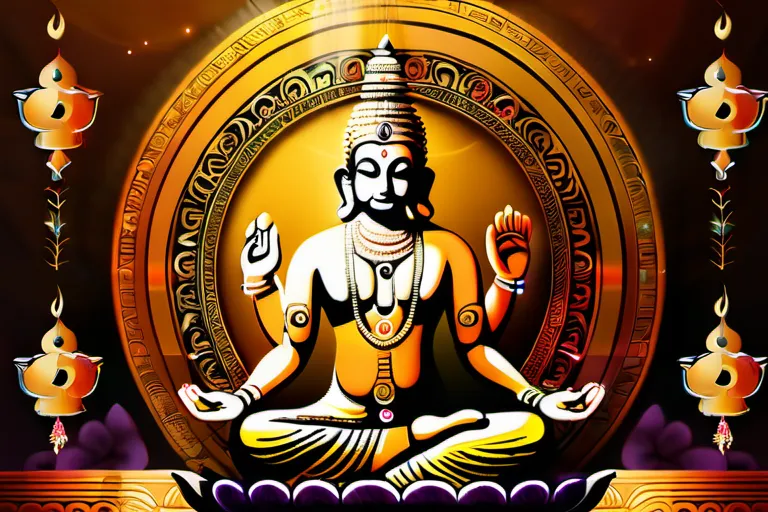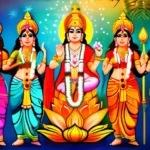Explore the beliefs, origins, and impact of karma on Hindus
Karma, a fundamental concept in Hinduism, is the belief that actions in this life influence one’s fate in future lives. In this article, we delve into the origins, interpretations, and implications of karma within the Hindu faith.
The Origins of Karma
Understanding karma begins at the very roots of Hindu philosophy, where its ancient scriptures and spiritual texts offer profound insights into the nature of cause and effect in our lives.
‘Where one stands is but a result of what one sows,’ goes an oft-quoted verse from the Bhagavad Gita. This line succinctly captures the essence of karma, suggesting that every action we take has consequences that shape our future experiences.
Delving into the origins, we find karma’s roots tracing back to texts like the Rig Veda, one of the oldest sacred scriptures in Hinduism. These ancient hymns hint at a cosmic law of retribution, where actions have consequences that echo throughout time and space.
The Upanishads, too, contribute to our understanding by linking karma with concepts like dharma (righteousness) and moksha (liberation). These texts paint a picture of life as a continuous cycle where the actions we perform today affect our future lives.
The Puranas further elaborate on these ideas, offering narratives that illustrate how karma operates. For instance, tales of Lord Rama and Lord Krishna often depict their actions leading to various outcomes, both good and bad, influencing their journeys towards enlightenment.
This intricate web of cause and effect forms the backbone of Hindu belief systems, guiding individuals to live ethically and morally, not just for this life but for those yet to come. By understanding karma, one can navigate the complexities of existence with a deeper sense of purpose and responsibility.
Interpreting Karma: Good and Bad Actions
Karma, in Hinduism, is often likened to a cosmic ledger where every action we take adds a line or erases one. But what exactly does this mean when it comes to good and bad actions? Is there really such a thing as an action that can be categorically labeled as purely good or bad?
Imagine life as a vast garden, where every seed we plant has the potential to grow into either beautiful flowers or weeds. The choices we make are like those seeds, and they determine our future experiences just as surely as light and water nurture the plants.
- Good Actions: When we perform actions that promote happiness and reduce suffering for ourselves and others, these are considered good. They are like sowing seeds of compassion and kindness in this garden. These actions not only benefit us but also create a positive atmosphere around us, making the soil fertile for more such seeds to take root.
- Bad Actions: Conversely, actions that cause harm or bring distress are seen as bad. They can be thought of as sowing seeds of negativity and discord. While these may yield short-term results, they ultimately create a barren ground where only similar seeds can grow.
The key question here is: Can an action ever truly be neutral? Many believe that every action has repercussions, no matter how small or seemingly insignificant it might appear. Even a moment of thoughtless anger can plant the seed for future conflict and misunderstanding. Conversely, even the smallest act of kindness can bring joy to someone’s life, planting seeds of goodwill.
This duality of actions brings us to a profound realization: our lives are not merely about surviving but thriving; they are about shaping our destinies through every choice we make. It is in this intricate dance between good and bad that the true essence of karma unfolds, teaching us the value of every moment and action.
The Law of Karma: Cause and Effect
Imagine karma as a cosmic balance scale, weighing every action you take throughout your life. Have you ever wondered why some people seem to attract good fortune while others face constant challenges? The Hindu perspective on karma provides insights into this mysterious and intricate concept.
Karma, in the Hindu tradition, is often described as the law of cause and effect. Just like planting a seed will eventually yield fruit, every action you perform has consequences that will manifest at some point. This idea is not just about past lives; it extends to your current life and future ones as well. But how does this work exactly?
Consider the metaphor of a garden where each seed you plant represents an action or thought. The soil, water, and sunlight are like the conditions in which these actions take root. Over time, these seeds grow into plants that bear fruit, symbolizing the results of your karma. Some fruits may be sweet, representing positive outcomes; others could be bitter, signifying negative consequences.
Now, think about a domino effect: each action you take can set off a chain reaction, influencing not just your current life but also future ones. This interconnectedness is what makes the law of karma so profound and transformative. It challenges us to reflect on our actions and their potential long-term impacts.
In this context, every thought, word, and deed matters. Small actions can have significant repercussions, and they all contribute to the overall balance of your life and future lives. The key is in cultivating awareness and mindfulness, ensuring that each action you take aligns with moral values and ethical principles.
Understanding karma as a law of cause and effect invites us to view our lives not just as isolated events but as part of an interconnected web of actions and reactions. This perspective can be both liberating and challenging, urging us to live with intention and purpose.
- How do you approach your daily actions?
- Do you ever wonder if there are hidden consequences behind what seems like random occurrences in life?
- In what ways could the law of karma influence how you make decisions?
The law of karma is a profound concept that encourages us to live with mindfulness and compassion. By understanding and applying this ancient wisdom, we can navigate our lives more meaningfully, striving for a balance that brings positive outcomes not only for ourselves but also for the world around us.
Karma and Reincarnation
Imagine karma as the invisible thread that weaves through our lives, connecting one moment to another like beads on a string. In Hinduism, this concept of karma is deeply intertwined with the idea of reincarnation. How do these two ideas shape our understanding of rebirth?
In the Hindu tradition, reincarnation is not just about coming back as something different; it’s about evolving through numerous lifetimes. This cycle of birth and death is known as the samsara. Each time we are born again, our experiences in this life—our actions, words, and thoughts—are what carry us forward. But why does reincarnation matter if we could just reset with a clean slate every time?
Reincarnation isn’t merely about starting over; it’s a profound journey of learning and self-discovery. Just as a caterpillar must transform into a butterfly through a complex process, human souls go through various stages to reach spiritual enlightenment. The question arises: How do our actions in one life impact the next?
The relationship between karma and reincarnation is like planting a seed. What we sow now determines what will grow later. Good actions lead to a better rebirth, while negative ones might result in a challenging new life. This cycle of cause and effect means that every choice we make has consequences, not just for this moment but for the lives yet to come.
So, as you reflect on your daily choices, consider how they will shape your future. Are you sowing the seeds of happiness or suffering? The Hindu perspective views life through a lens of continuity and transformation, where every experience is a step towards ultimate liberation from the cycle of rebirth. It’s not just about surviving each day but thriving in every incarnation that lies ahead.
How do you see your role in this eternal dance of karma and reincarnation? Are you ready to embrace the journey with wisdom and compassion?
Understanding Karma: The Hindu Perspective
The Role of Karma in Daily Life
How does karma shape our daily lives as Hindus? It’s like navigating through a vast forest, where every step you take leaves a mark that echoes into eternity. In Hinduism, karma isn’t just about past actions; it’s woven into the very fabric of your present and future moments. Every decision, every thought, even your smallest acts—like choosing what to wear or how to greet someone—all carry weight.
Consider this: when you decide to donate to a charity or help an elderly person cross the street, are you just doing a good deed? Or is it more than that? Could these actions be seen as seva, or service, which directly impact your karma for the better? The practical implications of karma extend beyond just ethical considerations; they influence everything from your personal relationships to your professional life.
Rituals play a significant role in managing one’s karma. For instance, during major festivals like Diwali or Navratri, Hindus often perform puja (worship) and offer prayers as a way to purify their souls and align them with cosmic justice. These rituals are not just about seeking blessings but also about understanding the balance between good actions and bad.
When making decisions in daily life, ethics come into play. Should you tell a lie to avoid hurting someone’s feelings? Or is it better to always be truthful, even if it causes discomfort? The answer often lies in how your action will affect your karma. A true Hindu seeks to live a life of dharma (duty and righteousness), constantly striving for balance and harmony.
Decision-making becomes more than just personal; it’s about considering the broader implications on one’s spiritual journey. Every choice you make can lead you closer to or farther from moksha, liberation from the cycle of rebirth. This is why many Hindus embrace principles like ahimsa (non-violence) and truthfulness, seeing these as not just moral virtues but as paths toward better karma.
In essence, understanding karma in daily life is about cultivating self-awareness and mindfulness. It’s about recognizing that every action has a consequence, whether seen or unseen, and that the choices you make today will shape who you are tomorrow.
Karma and Modern Hinduism
As we explore karma and its evolution within modern Hinduism, one cannot help but wonder how this ancient concept remains relevant in our fast-paced, globalized world. Karma, often seen as a cosmic law of cause and effect, continues to shape the ethical fabric of daily life for millions of Hindus worldwide. In today’s digital age, where information travels faster than light, the relevance of karma becomes even more profound.
Consider this: in a society bombarded by instant gratification and fleeting connections, how does the idea of prarabdha karma, or the effects of past actions, guide modern Hindus? Can we draw parallels between karma and the principles of accountability and responsibility that drive contemporary businesses and ethical practices?
The concept of karma is not just about personal morality but also encompasses societal norms. In a world grappling with issues like climate change, social inequality, and technological ethics, how does prarabdha karma influence individual actions? Do the actions we take today have consequences that extend beyond our lifetime, shaping the future of humanity in ways we can barely imagine?
Karma yoga, or the path of selfless action, provides a practical framework for navigating these complexities. It encourages individuals to perform their duties without attachment to outcomes, promoting a sense of duty and responsibility towards society. In this era of social media and digital activism, how can karma yoga inspire people to make meaningful contributions that go beyond mere likes and shares?
Moreover, the concept of sanchita karma, or accumulated past actions, raises intriguing questions about personal growth and transformation. How do our choices today impact our future lives? And in a world where change is constant, can individuals truly break free from their past karmic binds?
As we delve into the evolution of karma within modern Hinduism, it becomes clear that this ancient concept remains a dynamic force. It challenges us to reflect on our actions and motivations, urging us to live with intentionality and consciousness. In an age dominated by instant gratification, karma serves as a timeless reminder of the interconnectedness of all beings and the profound impact each individual has on the world around them.
Conclusion
 By understanding the complexities of karma, we gain a deeper appreciation for the interconnectedness of actions, consequences, and spiritual growth in Hinduism.
By understanding the complexities of karma, we gain a deeper appreciation for the interconnectedness of actions, consequences, and spiritual growth in Hinduism.











